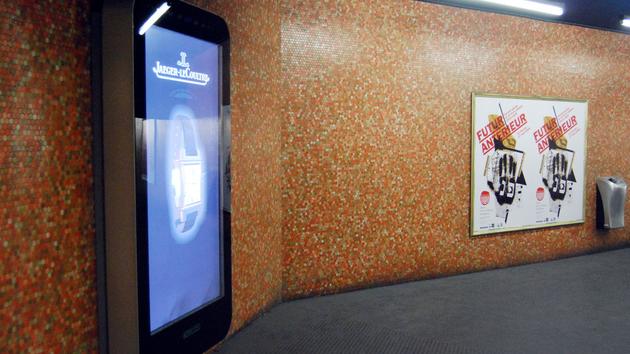In major French cities, the night is never absolutely black. In addition to lighted windows and public lighting, many advertising screens have flourished in recent years behind store windows, in stations or even in the recesses of the metro. With the approach of the municipal elections next March, these digital advertisements could become part of the political debate in the big cities. If some candidates do not wish to decide on a potential ban, others denounce "unnecessary pollution" .
Read also: Towards the end of advertising screens in public space?
This is particularly the case of the member for Deux-Sèvres and former Minister of the Environment, Delphine Batho, who tabled a bill in the National Assembly on February 5 to ban these advertising screens in public space. "The objective is to put an end to this aberration which leads to unnecessary energy consumption in these times marked by climate change, but it is also linked to a public health imperative ," she said in Le Figaro . “Studies have followed one after the other to prove that children under the age of 6 should not be exposed to screens, but there they install billboards everywhere in public space. However, we cannot control the age of the people who pass in front of these screens every day, ”she insists.
The member justifies this ban by the excessive energy consumption that these advertising screens generate. "A digital square meter of two square meters consumes 7000 KWH / year, which is equivalent to the annual consumption of a household with a child," she says. In addition, the consumption of an advertising video screen is up to 15 times higher than that of a panel with a backlit paper poster. Figures constantly increasing in recent years in our cities due to the multiplication of these signs. The Electric Transport Network (RTE), in its annual forecast electricity balance for 2019, describes the energy consumption they generate as superfluous and recommends eliminating them, which would represent a daily gain of 0.1 GW of energy over the territory.
Read also: Digital signage sows discord in Paris
In addition to the energy consumption that these panels generate, digital and illuminated advertisements are the source of significant light pollution. Insects are the first victims because of a disturbance in the biological clock of the species. But humans are also affected by excessive use of artificial light which disrupts circadian rhythms. Children are the first victims with overexposure to screens which, according to numerous studies, would harm their intellectual development. The World Health Organization, in guidelines published in April 2019, just like the Defender of Rights, in a report published in 2018, warned of the harmful effects of the use of all forms of screens for children under the age of six and recommend banning its use, notes the bill brought by Delphine Batho.
Read also: Artificial light, neglected culprit in the disappearance of insects
Far from France, the manufacture of these digital panels represents a significant environmental cost, in particular due to the destruction of rare earths in Asia necessary for their design.
Thousands of screens across France
In Paris, 704 digital screens have been installed in the metro and 686 in major stations, not to mention the thousand present in store windows. In Lyon, a hundred digital advertising screens have gradually appeared in metro stations over the past two years. In Rennes, thirty double digital signs have been installed in the city, and forty others will soon be installed in the metro. In the Lille metropolis, the advertising display contract for the transport network signed in October 2019 provides for the installation of 160 digital screens on bus shelters and in underground metro and tram stations. In Nantes, around sixty screens must be installed. In Nice, there will be seventy-three. Finally, in the Hauts-de-Seine, seventy-two digital advertising screens will be installed in 34 cities.
As the municipal elections approached, several candidates declared themselves to be banned, notably in Paris. For the time being, the legislation in force - article L 581-14 of the Environment Code - authorizes the deployment of digital advertising panels "within the grip of airports, railway stations and major sports facilities" . In other words, in these places the mayor does not have the power to ban them outright. Regarding store windows, there is no legislative provision to regulate digital advertising.
During the debates on the bill on the fight against waste and the circular economy, the National Assembly had adopted an amendment giving mayors the power to prohibit any form of digital advertising in the territory of their common and in stations, stations and stops of public transport. This provision was however removed by the Joint Joint Committee, when it would have authorized the prohibition of digital advertising screens by the municipalities which would have wished.
Powerless mayors?
If the mayor does not have, for the time being, the power to ban these signs in the entire public space, some candidates take up this subject. On the side of the outgoing mayor of Paris, Anne Hidalgo, we put forward that "the mayor has no control over this subject" but that " we support in a personal capacity" the bill proposed by Delphine Batho. "If Anne Hidalgo is elected, we will not put these signs on public space" , we argue again. Since 2011, this regulation formally prohibits digital advertising panels in the streets of Paris. However, a review of the local advertising regulations has been initiated by the Paris Council since November 2017 in order to allow the use of "new technologies, including digital screens" . Jean-Louis Missika, assistant to the town hall in charge of town planning, planned at the time to endow the City with 15% of digital panels "connected, remotely controlled and adapted to their geographical location" , which would have the consequence of reduce "by as much the paper prints" . An argument shared by Jean-François Decaux, director of JCDecaux, in March 2019 on Franceinfo who defended its digital panels: "It's already better than sending someone with a car to change the poster" . A new consultation on the modification of the local advertising regulations must be launched after the municipal elections.
Read also: Municipal in Paris: the Hidalgo-Dati duel sets up, Griveaux remains good third
Cédric Villani, dissident candidate of LREM, indicates for his part in his campaign program that these screens will be banned if he is elected "not only on the public highway (...) but also in the stations, the metro stations and in the shop windows, if a law opening this possibility is well voted ” .
Same story with David Belliard, EELV candidate, and Danielle Simonet (LFI) who are against the installation of these digital panels. "We will refuse the generalization of advertising screens and put an end to the signs in the streets," wrote the environmental candidate on Twitter.
On the campaign site of Rachida Dati, LR candidate in Paris, no proposal in this sense is put forward but the spokesperson for the mayor of the 7th arrondissement affirmed on February 7 at a public meeting that the candidate was "Against the authorization of digital screens" . Finally, on the side of Benjamin Griveaux, LREM candidate, no proposal is there either, in his first proposals unveiled on his campaign site.
“? For JCDecaux, is digital beneficial?” - Watch on Figaro Live







/cloudfront-eu-central-1.images.arcpublishing.com/prisa/ZUBQ7UCFTJCYTB4SMLNMUZIDQ4.jpg)
